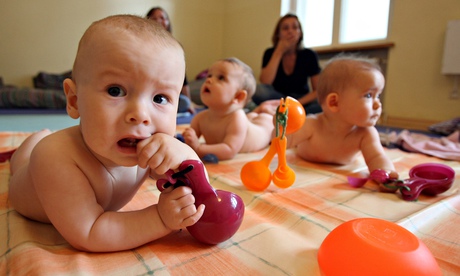
Health experts have highlighted a new approach in the fight against obesity: they want to target future mothers and advise them how to avoid giving birth to overweight children.
By helping women even before pregnancy, a key step could be taken to tackle Britain’s rising levels of obesity, according to a report published by the Infant and Toddler Forum last week.
Childhood overweight and obesity levels – which are linked to elevated risks for illnesses such as diabetes and heart disease – currently stand at around 30% and show no sign of dropping despite campaigns urging youngsters to eat healthily and take more exercise.
An additional approach is needed – helping women to control their own weight during pregnancy and so avoid having overweight children, argues the forum, a group of experts in child health, nutrition and midwifery. As they point out, recent research has made it clear that a mother’s weight and nutritional state has a long-lasting effect on her children’s own weight and health. Obese mothers have increased risks of having children who become obese in later life and suffer from cardiovascular disease.
“Pregnancy and pre-conception need to be our new focus,” said the forum’s head, paediatrics expert Professor Atul Singhai of University College London. “We need to focus earlier on in the life cycle to influence nutrition and other choices, from before conception through to pre-school.”
This point was backed by women’s health expert Professor Lucilla Poston, of King’s College London. “The message for a pregnant woman today is quite simple: the last thing you should do is eat for two. Eat a normal diet for one and you are more likely to be healthy – and that goes for your baby as well.”
The importance of a healthy diet during pregnancy is supported by the story of Tamara, from Windsor. She is seven months pregnant with her second baby. “Ten years ago, when I had my first child, I was encouraged to eat as much as possible. I was eating for two, I was told.
“I put on five stone during my pregnancy. I didn’t know any better and no one advised me not to. My son, who was heavy even when he was only a few weeks old, is now very chunky and I have to take considerable care about what he eats.
“The fact I was overweight during that pregnancy is not the only reason for him being overweight, of course, but it was very likely a factor. That is why I am taking greater care during my second pregnancy. I have gone to a slimming club and have continued going to the gym until very recently. Young mothers need to be advised about this sort of thing, but that is not happening.”
Providing help and advice for young mothers is the key message of Early Nutrition for Later Health: Time to Act Earlier. The report, which involved surveying 1,000 mums and 150 healthcare officials, has been published on the 10th anniversary of the founding of the Infant and Toddler Forum, which is supported by a grant from the children’s food company Danone Nutricia.
The crucial point is that obesity in both mother and child is not simply a matter of a shared environment in which both eat too many fatty foods, the forum argues. “An overweight mother will nurture a child in her womb that has raised glucose levels and who is more likely to be overweight in its own right,” said forum member and nutritionist Judy More of Plymouth University.
During pregnancy, a mother should be encouraged to eat less saturated fat and drink few sugary drinks while eating more brown rice, brown bread and porridge, added Poston. The problem is finding ways to get this advice over to young women. “We need to do this when they are very young – before they have children, so they are well prepared. Certainly, the dangers of being overweight during pregnancy cannot be exaggerated.
“It is remarkable that a lot more GPs do not alert women about these risks when they come for check-ups during pregnancy,” added Poston. “The trouble is that doctors are overstretched. They need to given time to give more detailed advice. We need a much better system of support.”

